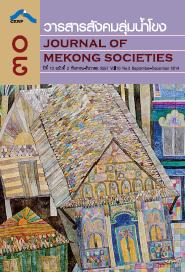Everyday Politics of Rural Households in the Isan Region under the Context of Sugarcane Growing as Energy Crops
Main Article Content
Abstract
This article investigates the impacts of the expansion of the sugarcane and ethanol industries on village households in northeast Thailand from 2007 onwards. It highlights the villagers’ everyday politics which are closely related to their adjustment of livelihood strategies. Based on a mixed-method research, the findings from Khon Kaen and Kalasin provinces revealed that farmers managed their lands or negotiated land rental as the sugar companies and state authorities encouraged rice farmers to grow sugarcane aiming to increase supplies for ethanol production. Moreover, they continued to farm other ‘political crops’. Contract and non-contract sugarcane farmers evaded some contractual arrangements disadvantageous to them and made themselves eligible for credits and price supports provided by the government. They used local administrative organizations as mediators and their supporters to settle disputes over pollution problems with the companies. These everyday political acts contributed to the persistence of northeastern households whose economic base has remained agriculture.


